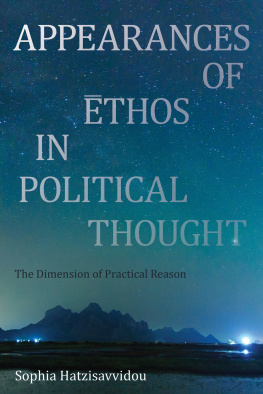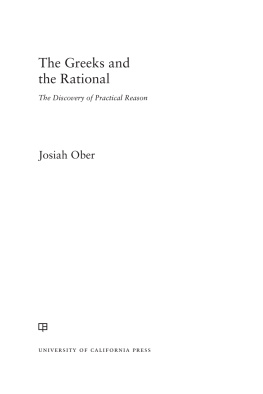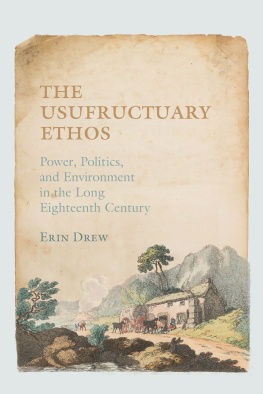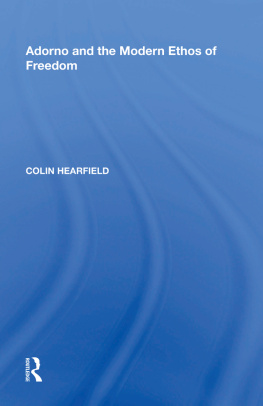Appearances of thos in Political Thought
Appearances of thos in Political Thought
The Dimension of Practical Reason
Sophia Hatzisavvidou
London New York
Published by Rowman & Littlefield International Ltd
A wholly owned subsidiary of The Rowman & Littlefield Publishing Group, Inc.
4501 Forbes Boulevard, Suite 200, Lanham, Maryland 20706
www.rowman.com
Unit A, Whitacre Mews, 26-34 Stannary Street, London SE11 4AB, United Kingdom
Copyright 2016 by Sophia Hatzisavvidou
All rights reserved. No part of this book may be reproduced in any form or by any electronic or mechanical means, including information storage and retrieval systems, without written permission from the publisher, except by a reviewer who may quote passages in a review.
British Library Cataloguing in Publication Information Available
Library of Congress Cataloguing-in-Publication Data Is Available
ISBN 978-1-78348-312-9 (cloth : alk. paper)
ISBN 978-1-78348-313-6 (pbk. : alk. paper)
ISBN 978-1-78348-314-3 (electronic)

The paper used in this publication meets the minimum requirements of American National Standard for Information SciencesPermanence of Paper for Printed Library Materials, ANSI/NISO Z39.48-1992.
Printed in the United States of America
Contents
This book would have never taken this form if it was not for the people and the events that shaped my perception of the topics it features. Alan Finlayson provided the much appreciated support, guidance, and insight that turned an assemblage of ideas and intuitive reactions into an argument. I remain grateful to him. Sam Chambers and Dimitrios Akrivoulis helped me through my very first steps in political theory; I continue to benefit from their encouragement and intellectual rigorousness. Don Herzog wrote a the most insightful, motivating, and useful review of a book proposal one could ever hope for; I thank him for his advice and I hope that one day I will write as well as he does. I am thankful to the people who read, heard, and commented on various aspects of this work: Judi Atkins, Mark Devenney, and Nick Turnball, for their enthusiastic comments and constructive criticism at the Annual Political Studies Association Conference; Antonio Cerella and Louiza Odysseos at the workshop Heidegger and the Global Age; Aurlien Mondon and Dai Moon, who gave me the opportunity to present my work at the Politics beyond the Mainstream seminar series at the University of Bath. I am especially indebted to Jim Martin for his wonderful support. I have tried to take their questions, comments, and suggestions on board; however, I acknowledge that responsibility for what follows remains exclusively my own.
Finally, the brilliant people at Rowman & Littlefield International took taken every effort to make the process of completing this project less complicated; I thank Anna Reeve for commissioning the book and Dhara Patel for carrying the process to its completion. A much earlier version of appeared in Ethics and the Environment 20.2 (2015); thanks go to the anonymous reviewers and to Indiana University Press for permission to use material from that article here.
I want to thank especially my friends and family for their enthusiasm and care: Theoni, for the relaxing Saturday coffee mornings; my sister Katerina, for the amazing time we always have together; and of course my partner Miltos, for all his patience and faith, as well as the cups of coffee that landed on my desk. My parents care and support has been tremendous; I cannot thank them enough here.
This book can only be dedicated to my son. His worldly perception of life keeps me connected to all these things that matter the most. With my apologies for all the times and hours that I was not there, this is for you, my boy.
Summer 2015, somewhere in Northern Greece. A few days ago, the Greek government had abandoned its radical anti-austerity agenda and had signed a new bailout agreement to extend the countrys lending programme for the third time since 2010. I interrupt my seaside walk to chat with a pottery maker who exhibits his crafts on a small table in the shadow of a pine tree. One ought to adjust to the circumstances, he tells me to justify his presence at the beach. I used to work only in my workshop; now the circumstances have changed, so I must change, he continues. Like this pottery maker, political subjects shift positions, political affiliations, spaces, and modes of operating as they encounter emerging crises and events and as they try to relate themselves to them. How does the specificity of an era that has been defined as the Anthropocene, with its emphasis on post-Fordist production, intensive consumption, and planetary management, impact political engagement? Does it forge or urge the emergence of new forms of political organisation and new political visions? Can we rethink of the place or role of human agency, of anthropos , in this new era in a way that resists anthropocentrism and prevents environmental destruction, even though it acknowledges the ineradicable influence of the human estate in the world? Does the intertwinement of time, agency, and political transformation entail that we should embrace politics as the realm of an anything-goes approach, where the political subject is as the occasion demands? Or is it possible to anchor political experience to something more solid, without subordinating politics to morality or even without rendering democracy to a justificatory principle of its own?
This book negotiates the tensions that are imbricated in these interrelated questions. It does so by reworking the concept of thos and by restoring the broken link between the ethotic and the intellectual dimensions of human experience. It makes the case for a particular account of a world-affirming thos, one that is permeated by a protean form of practical reasoning and that enables individuals and collectivities to engage the world politically, as they attempt to forge a more just arrangement of the scheme of things. Eventually, the book conceptualises a form of democratic politics that not only expresses dissent, but furthermore participates in the effectuation of social and political change. The idea that underscores the argument proffered in the book is that, although politics does not begin and end with thos, the quality of dispositions, attitudes, and forms of engagement that an thos brings in political life is decisive in the formation of democratic arrangements.
Theoretically, the book is a contribution to the strand of political thought that affirms politics as an ongoing struggle between agents of contending perspectives on political and ethical issues. More specifically, the book intervenes in the ongoing discussion within this particular strand with regard to the role that some form of thos plays in the formation of political judgements and practices, as well as in the temporary resolution of political conflicts. Conceptually, the book provides a more nuanced understanding of the concept of thos, both by mapping its trajectory from antiquity to late modernity and by articulating a particular account of political thos that proves pertinent to the current state of affairs. The latter is to a great extent characterised by the inextricable intertwinement of liberal democracy with economic liberalism and the consequent debilitation of democratic politics, coupled with the acceleration of pervasive ecological change. Although the book thematises certain elements that inform the political capacity of human beings, at the same time it does not assume that political agency or the capacity to political transformation is a trait exclusive to human components of the world. Ontologically, then, the argument that I develop resists anthropocentrism in political thought, namely by proposing an account of justice that, despite being perceived as informing a more just engagement of human beings with the world, disrupts the binary between agency/resource and advances a non-anthropocentric understanding of the cosmic order.

 The paper used in this publication meets the minimum requirements of American National Standard for Information SciencesPermanence of Paper for Printed Library Materials, ANSI/NISO Z39.48-1992.
The paper used in this publication meets the minimum requirements of American National Standard for Information SciencesPermanence of Paper for Printed Library Materials, ANSI/NISO Z39.48-1992.







